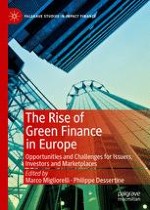2019 | OriginalPaper | Buchkapitel
5. Financial Performances of Green Securities
verfasst von : Dirk Schiereck, Gunnar Friede, Alexander Bassen
Erschienen in: The Rise of Green Finance in Europe
Verlag: Springer International Publishing
Aktivieren Sie unsere intelligente Suche, um passende Fachinhalte oder Patente zu finden.
Wählen Sie Textabschnitte aus um mit Künstlicher Intelligenz passenden Patente zu finden. powered by
Markieren Sie Textabschnitte, um KI-gestützt weitere passende Inhalte zu finden. powered by
